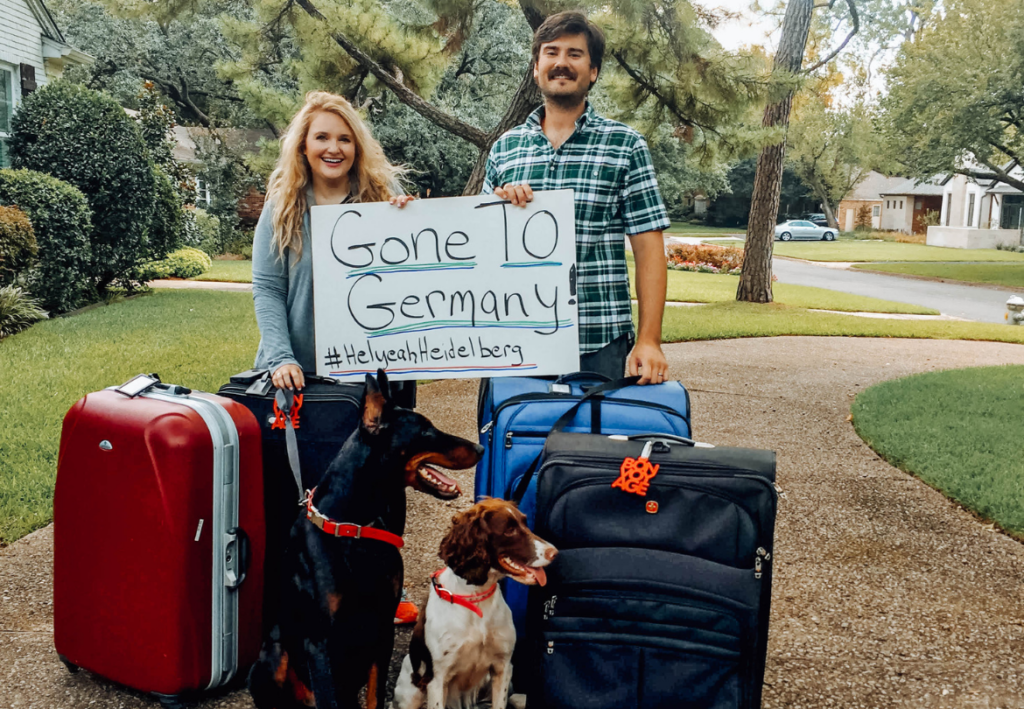If you're visiting the Christmas markets in Germany these are the foods you should try!
Picture this: you're strolling the beautiful, charming, fairy-tale lanes lined with stalls of the German Christmas Markets. You're bursting with Yuletide cheer and you're gawking at the beautiful Christmas decorations. But, what do you eat?! There are so many smells! And what's the best drink? I'm here to tell you what to eat and drink at German Christmas markets. Having been to over 100 Christmas markets in Europe, I'm pointing you in the right direction.

I'm bringing you the 25 foods (and drinks!) you must try at a German Christmas Market.
The most common food items sold at German Christmas markets include Bratwurst, Frikadella, Pommes Frites, Maroni, Käsespätzle, Kartoffel puffer, Germknödel, along with glühwein, aka mulled wine. But each market has their own specialty and take on food for Christmas.
There's nothing in the world quite like the magic at the Christmas markets. And part of that joy is brought in the form of the incredible food. From the fragrant spiced nuts, traditional German meats, and dangerously delicious alcoholic Glühwein, there's no shortage of things to try while you're at the Xmas Market.w Whether you crave savory or sweet you can find it all! Plus plenty of souvenir foods to take home.
In Germany, the chestnuts really are roasting on an open fire, but that's not the only thing to try! I'm breaking it down by drinks, food, and sweets. I hope you pack some Lycra, because you'll need your stretchy pants after attending the delicious Christmas market!
The Weinachsmarkt are filled with people from all over- from locals to tourists. But if you've been around the markets you know the tastiest eats. During the holiday season, Germans bring out the best in food, drink, and holiday spirit.
See the best Christmas markets in Europe!

Know that many markets offer different specialties depending on the region you're in. Not only will you find dishes from the German regions, many Christmas markets partner with other countries and bring specialties from around the world. You might find Hungarian Chimney Cake (Kürtőskalács – say that three times fast) or Swiss raclette. I'm covering all the bases and picking the best things to eat in Germany during Christmas. With so many food and drinks options, I'm here to help you sniff out what tastes good, will fill you up, and the most recommended Christmas market food!

You Might Like:
What to Drink at the Christmas Market

Glühwein
As a bonafide Christmas Market freak, as soon as the first market opens my first stop is Glühwein. The best part about Christmas is that it's truly 5 o'Clock somewhere, all day long. Drinking the hot, mulled wine is the perfect way to get into the spirit. The word “Glühwein” can be translated into English as glow wine which derived from the red hot irons used to heat up the wine as they did in Medieval times, dating back to 1420.

Now, you'll find a variety of Glühwein sold throughout the markets. Traditionally, the drink is a mix of red wine combined with spices like cinnamon, star anise, vanilla, and sugar. You can find a many different versions Glühwein, and each market, and even stall, has their own take. You'll find Glühwein available in a few different flavors like cherry, apple, or blueberry, and even a white Glühwein. Of course, if you want to take it up a notch, you can add an extra shot to your Glühwein.

Don't forget to try the famous Feuerzangenbowle – hard to say, delicious to try! This is where they pour the steaming rum over sugar that then melts into the wine and fuses the flavors together. It's fantastic!

There is also kinderpusch which is non-alcoholic Glühwein.
When you buy a drink it comes with a “pfand”, you pay extra so that you bring the cup back. OR, you can always keep it as a souvenir from the market! Each cup is produced with a different motif and often has the city name and the date. We have cups from markets all across the continent and it's a great memento.

Glühwein Price – typically €3 – €5 + €3-4 for the pfand
Eierpunsch

Similar to eggnog, this warm drink is made of egg yolks and cream and alcohol. This isn't my drink of choice, but it's worth it to give it a try, especially if you're a fan of eggnog.
Price – typically €3 – €5 €3-4 for the pfand
Did you know… we love Christmas Markets so much we chartered our own ships to bring people to Christmas markets in Europe?!
Heiße Schokolade – Hot Chocolate

The great thing about German Christmas markets? You can make almost any drink alcoholic. Add in a shot of rum or baileys and you're in for a treat.
Schnapps
This very strong drink is often served like a shot and is fruit flavored. You could add this on top of your Glüwein or just shoot it straight! Peach schnapps is one of my favorites.
Price – typically €1 – €2
Note: all drinks are *typically* served in the souvenir cups so they all have a pfand.
Price – typically €3 – €5 €3-4 for the pfand

You Might Like:
Savory food favorites at the German Christmas Markets
Sausage – Bratwurst

No, I'm not saying German sausage is the worst, sausage in Germany is called “wurst.” And to be honest, it's some of the best around. Germany is known for it's wonderful sausage and the Christmas markets bring out the best. There are many different kinds to try (40, in fact!) and it's often served on a bun with mustard and onions. You can also try Currywurst which is a Berlin specialty of Bratwurst cut into pieces and served with curry on top. Of course, you can also try the “half meter wiener” – a 1/2 meter of bratwurst which is huge and the perfect picture opp!
Price – typically €4 – €6
Frikadella

One of my favorite foods at the Christmas markets are these hamburgers made with pork. Usually served with onions and mustard they make for the perfect hearty meal. You'll often see a huge pan of onions roasting next to these filling meats.
Price – typically €4 – €6
Pommes Frites – Fries

I know what you're thinking, Helene, it's just fries? Yes, but no. Everyone loves a good fry, and the German Christmas Markets have the best ones I've ever tasted (in case you're wondering Heidelberg's market near the Church has my favorite!). Thick cut pommes seasoned and often topped with mayo will certainly cure what ails you. It also goes very well with your cup of Glühwein.
Price – typically €2 – €3
Maroni – Roasted Chestnuts

Little stalls or stands serve up the hot chestnuts roasting, quite literally, on an open fire. They are quite large and melt in your mouth. A perfect snack for the cold temperatures.
Price – typically €2
Potato Pancakes – Reibekucken & Kartoffelpuffer

This one is a heavy dish so I suggest to share it with a friend! But man, is it worth the calories. Dripping in oil it's like flattened hashbrowns, fried up and served hot. This can be topped with your choice of garlic sauce or apple sauce. It sounds weird, but it's delicious! If you'd rather have something slightly more light, try the Kartoffellanzen, a spiraled potato, fried and seasoned. I said slightly more light.
Price – typically €3.50
Käsespätzle

Remember as a kid when you'd eat a whole box of macaroni and cheese for dinner? This is like that, except better. Noodles slathered in a variety of cheeses and topped with onion. It's one of my favorite foods and a traditional German staple. When I first moved abroad people told me food in Germany wasn't that good. They were wrong, and I knew it as soon as I took a bite of Käsespätzle.
Price – typically €3 – €5
Lángos
This is a Hungarian dish and very delicious. A flat piece of dough is friend and then topped with sour cream and cheese. You can also add some other toppings some as vegetables or meat.
Price – typically €3 – €5
Spiessbraten


Delicious roasted porks are seen spinning on spickets on top of a flame. Then, they are brought to the counter, cut and served on soft rolls. I always ask for an additional bit of crispy pork on top! This savory specialty is great if you've had your fill of wursts.
Price – typically €4 – €6
Raclette
If you like cheese and bread then there's nothing better than when its melted and served warm. My mouth is watering as I type out these very words! A typical French and Swiss dish, it's made it's way over to Germany and I'm glad to see it. You can also add toppings if you choose but you'll find the traditional raclettte is the perfect pick-me-up after one too many Glühweins.
Price – typically €3 – €5
Flammkuchen

This is an Alsacian specialty (the region that borders France and Germany) and combines their traditions. Think of it like a flatbread pizza: a thin crust topped with creme friache, cheese, onions, and bacon. There are of course other toppings you can choose from, but I always go with the traditional.
Price – typically €3 – €5
Grilled Fish

Many markets such as the one in Baden Baden offer fresh fish roasting on a flame. You'll sometimes see salmon and even smoked eels. It's wildly popular with some and others pass. This is a traditional dish in many of the German festivals and is worth the try.
Price – typically €5 – €7
Sweet treats to try at the German Christmas Market
Candied Nuts – Mandeln
The most fragrant and tempting smell of all: candied nuts. Sold in a variety of flavors and nuts, you cannot go wrong with this delicious, warm treat. Many stalls offer unique flavors like wedding cake, Baileys, or hot chocolate. The nuts are roasted in a pan with the sugary mix and wrapped up in paper. It's difficult to resist the sweet smelling nuts as you stroll down the cobblestone streets.
Price – typically €2 – €6 depending on the size of bag you get.
Schaumkuss or Schokokuss

The best way to describe this dessert is to take marshmallow fluff, then cover it chocolate, and eat a dozen. Really, these are inexpensive and are so light and fluffy. I get one almost every time I go to a Christmas market.
Price – typically €0.50-0.70
Germknödel

This popular round dumpling is a German classic and usually filled with jam and topped with vanilla cream sauce. It’s not overly sweet but a nice addition to your mulled wine.
Price – typically €4
Stollen – German Christmas Cake
This is one of the oldest traditions in German history- dating back to 1329! This cake is often a dense batter filled with nuts or fruit and dusted in powdered sugar. Legend goes that the shape of a Stollen looked like baby Jesus wrapped up in a blanket! Dresden is known for the most popular Stollen.
Price – typically €10 for a loaf
Gingerbread – Lebkucken

Often adorning stalls and sold in the shape of a heart, these are sold throughout the market. While I love homemade gingerbread, I find the market gingerbread to be very dry and not sweet enough. Stick with the candied nuts! They also like to sell it in heart shapes, wrapped in plastic, with words written on the cookie. I can’t say these are very tasty, but they are pretty!
Price – typically €0.50 – €1
Crepes
Not just found in France! This thin pancake is a delicious treat that's easy to eat. Rolled up with your choice nutella, cinnamon, sugar, or honey, anyone can get their fill from this simple classic.
Price – typically €2 – €4
Marzipan

Michael goes crazy for this treat every year! It looks like dough but it's a mix of almonds, honey, sugar, and eggs. Often they will sell “Marzipan potatoes” or it can be in a number of different shapes.
Price – typically €0.50 – €2
Kürtőskalács – Baumstriezel – Chimney Cake

This is a Hungarian and (more recently) Czech treat but is now spread over to the German and other European Christmas markets. For good reason, it's tasty! Dough is wrapped around an iron and then roasted and dusted with cinnamon and sugar.
Price – typically €2
Donuts

The best donut I've ever had in my LIFE was at the Christmas market in Helsinki, Finland. It was so good we went back for more… and more. The donuts sold at the markets are also great and often very different from American donuts. I love the little donut holes, very light and fluffy.
Price – typically €.50- €1
Fruchtspieße – Chocolate Covered Fruit

Take delicious strawberries then cover them in chocolate and put them on a stick and you have Fruchtspieße. Often displayed in chilled cases these are a refreshing dessert if you're needing something to cool down. You can also go for the Candied apples (paradiesäpfel) if you like.
Price – typically €2
There's also a variety of many other treats like candies, cookies, and more! Be on the lookout of the chocolate made to look like tools – they are so lifelike.

What's it like to work at a stall for Christmas markets?
Many of the stalls are family owned. You'll often see an array of generations that work behind the counter cooking food, taking orders, and payments. We also spoke with some younger workers who said it was a great job to have during the holiday break since you could make some money while you're off from University.
It's estimated that 188,00 people work at over 2,500 markets across Germany alone! They generate billions (yes, with a b!) of dollars each year.
Are you full yet?! You will be at the Christmas markets in Germany! It's well worth the calories for these delicious, once a year treats. Your best bet is to follow your nose and pick what you know you'll like. I might be a bit biased, but German Christmas markets really are the best.
Want more Christmas Markets? I got you!
Ultimate Guide for The Best Christmas Markets in Europe
15 Best Christmas Markets in Germany
25 Photos That Will Inspire You to Spend Christmas in Europe
The Best Winter Destinations in Europe
Pin the post:
















